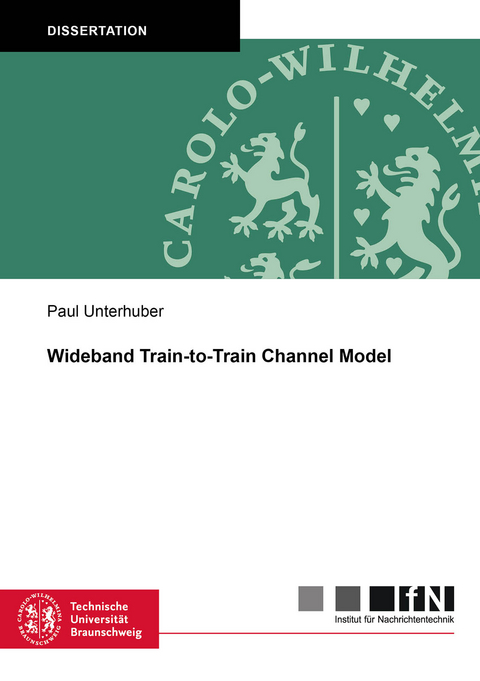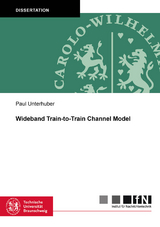Wideband Train-to-Train Channel Model
Seiten
Due to the continuous growth of passenger and freight transport and the simultaneous effort to reduce global greenhouse gas emissions, many countries are relying on railways. To increase efficiency and to ensure safety, novel operational concepts such as virtual coupling or autonomously driving trains are being developed.
These concepts require reliable and low-latency communication. Future communication standards will improve existing railway communications and enable highly reliable and low-latency train-to-train (T2T) communication. In order to achieve the required reliability, the propagation conditions must be taken into account when designing the radio systems. For safety critical applications, the investigation of correlated error events is of great interest. Hence, the channel model has to reflect the time-variant behaviour of the propagation channel. Suitable channel models for T2T communications were not available until now.
In this dissertation a wideband T2T channel model is proposed. The channel model is based on C-band measurements. For this reason, the worldwide first wideband T2T channel sounding measurement campaign was conducted. Due to the changing environment and the moving transmitter and moving receiver the propagation channel is shown to exhibit non-wide-sense stationary uncorrelated scattering. To reflect the time-variant behaviour of the channel and the typical geometry of railway environments a geometry-based stochastic channel model (GSCM) for T2T communications is introduced. The GSCM considers all relevant propagation phenomena and various railway manoeuvres.
Due to the continuous growth of passenger and freight transport and the simultaneous effort to reduce global greenhouse gas emissions, many countries are relying on railways. To increase efficiency and to ensure safety, novel operational concepts such as virtual coupling or autonomously driving trains are being developed.These concepts require reliable and low-latency communication. Future communication standards will improve existing railway communications and enable highly reliable and low-latency train-to-train (T2T) communication. In order to achieve the required reliability, the propagation conditions must be taken into account when designing the radio systems. For safety critical applications, the investigation of correlated error events is of great interest. Hence, the channel model has to reflect the time-variant behaviour of the propagation channel. Suitable channel models for T2T communications were not available until now.In this dissertation a wideband T2T channel model is proposed. The channel model is based on C-band measurements. For this reason, the worldwide first wideband T2T channel sounding measurement campaign was conducted. Due to the changing environment and the moving transmitter and moving receiver the propagation channel is shown to exhibit non-wide-sense stationary uncorrelated scattering. To reflect the time-variant behaviour of the channel and the typical geometry of railway environments a geometry-based stochastic channel model (GSCM) for T2T communications is introduced. The GSCM considers all relevant propagation phenomena and various railway manoeuvres.
These concepts require reliable and low-latency communication. Future communication standards will improve existing railway communications and enable highly reliable and low-latency train-to-train (T2T) communication. In order to achieve the required reliability, the propagation conditions must be taken into account when designing the radio systems. For safety critical applications, the investigation of correlated error events is of great interest. Hence, the channel model has to reflect the time-variant behaviour of the propagation channel. Suitable channel models for T2T communications were not available until now.
In this dissertation a wideband T2T channel model is proposed. The channel model is based on C-band measurements. For this reason, the worldwide first wideband T2T channel sounding measurement campaign was conducted. Due to the changing environment and the moving transmitter and moving receiver the propagation channel is shown to exhibit non-wide-sense stationary uncorrelated scattering. To reflect the time-variant behaviour of the channel and the typical geometry of railway environments a geometry-based stochastic channel model (GSCM) for T2T communications is introduced. The GSCM considers all relevant propagation phenomena and various railway manoeuvres.
Due to the continuous growth of passenger and freight transport and the simultaneous effort to reduce global greenhouse gas emissions, many countries are relying on railways. To increase efficiency and to ensure safety, novel operational concepts such as virtual coupling or autonomously driving trains are being developed.These concepts require reliable and low-latency communication. Future communication standards will improve existing railway communications and enable highly reliable and low-latency train-to-train (T2T) communication. In order to achieve the required reliability, the propagation conditions must be taken into account when designing the radio systems. For safety critical applications, the investigation of correlated error events is of great interest. Hence, the channel model has to reflect the time-variant behaviour of the propagation channel. Suitable channel models for T2T communications were not available until now.In this dissertation a wideband T2T channel model is proposed. The channel model is based on C-band measurements. For this reason, the worldwide first wideband T2T channel sounding measurement campaign was conducted. Due to the changing environment and the moving transmitter and moving receiver the propagation channel is shown to exhibit non-wide-sense stationary uncorrelated scattering. To reflect the time-variant behaviour of the channel and the typical geometry of railway environments a geometry-based stochastic channel model (GSCM) for T2T communications is introduced. The GSCM considers all relevant propagation phenomena and various railway manoeuvres.
| Erscheinungsdatum | 10.02.2023 |
|---|---|
| Reihe/Serie | Mitteilungen aus dem Institut für Nachrichtentechnik der Technischen Universität Braunschweig ; 73 |
| Verlagsort | Düren |
| Sprache | englisch |
| Maße | 148 x 210 mm |
| Gewicht | 236 g |
| Themenwelt | Technik ► Elektrotechnik / Energietechnik |
| Technik ► Nachrichtentechnik | |
| Schlagworte | Channel Sounding • Geometry-Based Stochastic Channel Model • Railway communications • Train-to-Train Propagation |
| ISBN-10 | 3-8440-8921-7 / 3844089217 |
| ISBN-13 | 978-3-8440-8921-9 / 9783844089219 |
| Zustand | Neuware |
| Haben Sie eine Frage zum Produkt? |
Mehr entdecken
aus dem Bereich
aus dem Bereich
Kolbenmaschinen - Strömungsmaschinen - Kraftwerke
Buch | Hardcover (2023)
Hanser (Verlag)
49,99 €




